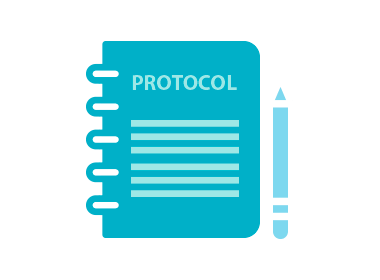Researchers identify new drug candidates in laboratories and evaluate their efficacy, safety and clinical values. Potential drug candidates are selected for further clinical development.
A drug must undergo clinical trials in humans to prove its safety and efficacy. To ensure the safe and smooth conduct of clinical trials, pre-clinical studies in animals must first be performed to evaluate the drug’s pharmacology, safety and effects.
A small group of healthy volunteers (usually <100) are involved to evaluate the safety and tolerability of a new drug. Absorption, distribution, metabolism and excretion of the drug in human bodies are studied through clinical observations and testing of blood/urine specimens of the volunteers. The results provide the basis for determining the doses in later-phase trials.
Phase 2 clinical trials are usually performed in a group of patients, ranging from a few dozens to a few hundreds. Phase 2 trials are often known as “proof of concept” trials, and typically adopt the “randomized, controlled design” where some volunteers receive the new drug and others receive a marketed drug or placebo, at different dose levels. The efficacy and safety of the new drug are then compared with those of the comparator, and suitable doses are determined for the phase 3 trial.
Phase 3 clinical trials involve a larger number of patients, from hundreds to thousands. They are randomly assigned to get either existing or new drug while neither the doctor nor the patients know which one they are taking. This is called “double-blind study”. Efficacy and safety are tested through stringent analysis. They are designed to demonstrate if the new drug is better or at least as effective as others on the market. Some of the phase 3 trials will also test its effect on patients’ standard of living. Once the regulatory authority accepts the clinical data, the new drug can be officially registered and used clinically.
All manufacturing, preclinical and clinical trial data relevant to the drug should be submitted to the regulatory authority for efficacy and safety evaluation and approval before being marketed.
It is also known as “postmarketing surveillance trial”. A Phase 4 trial may be conducted when a drug is on market and in wide use. It usually includes thousands of volunteers or more and aims at detecting side effects that may not be observed in earlier trials. Health economics evaluation may also be encompassed by Phase 4 trials.

Every clinical trial begins with the development of a study protocol. A study protocol is the basis for planning a clinical trial, for the purposes of protecting the safety of volunteers while achieving the research goals. A protocol must include essential information such as volunteer eligibility criteria, trial procedures, drug dosages and schedule of assessments.

Each clinical trial must be approved by an Institutional Review Board (“IRB”) and Hong Kong Department of Health to ensure that it is scientifically valid and aligns with the prevailing ethical standards. An IRB is composed of members with diversified areas of interest in order to achieve balanced consideration and proper protection of the rights and interests of volunteers. Researchers are required to provide updated status of the trial by submitting regular reports to the IRB throughout the trial period.

Researchers recruit suitable volunteers to join a clinical trial according to the criteria set out in the protocol. Comprehensive medical examinations are carried out at screening to confirm the eligibility of volunteers. During the trial period, their medical conditions are closely monitored. Volunteers are also required to attend follow-up visits or phone calls.

Statisticians analyze efficacy and safety data in accordance with the data analysis methods set out in the study protocol. The authenticity, accuracy and completeness of research data are of utmost importance as the clinical trial report will be submitted to the regulatory authority for consideration of a marketing registration application.
How to protect my rights and autonomy when joining a clinical trial?
To protect your health and safety and ensure compliance with all ethical, regulatory and scientific requirements, you should follow the instructions of the research team when participating in a clinical study. Before a clinical trial begins, investigators will explain to you the study design, procedures and potential risks/benefits. This is called the "informed consent procedure". You have the right to ask the investigators any questions until you fully understand and make your own decision. Participation is entirely voluntary. You also have the right to withdraw from the clinical trial at any time during the study.
How can I be included in a clinical trial?
Each clinical trial has its specific research objectives and therefore only volunteers who help answer the research questions will be eligible for enrolment. Such eligibility criteria may generally include age, gender, health conditions and other conditions. If you are interested to join a trial and deemed potentially suitable, you will be invited for screening through a series of examination (such as blood tests, x-ray and physical examination). You will be formally enrolled into the trial if you fulfill all the criteria, provided that vacancies are still available. In case volunteer enrolment has been closed, you may be offered the opportunity to be a back-up volunteer so that you may be invited to fill a vacancy in case another volunteer withdraws from the trial.
Am I suitable to take part in a clinical trial?
Different clinical trials require different types of volunteers, who may be healthy people or patients with specific medical conditions. You need to go through a screening process to confirm if you are eligible to participate in a trial. Clinical trials are stringent scientific research. To fulfill all scientific, safety and regulatory requirements, you should also be prepared to spare sufficient time and accept some necessary restrictions and inconvenience (e.g. complying with the study timetable and certain dietary restrictions). You may also consult with your family doctor if needed.
How could I know the arrangements and potential risks/benefits before joining a clinical trial?
Before deciding to join a clinical trial, investigators are obliged to explain to you the study design, procedures and potential risks/benefits. This is called the "informed consent procedure". An informed consent form will be given to you for reference. During the informed consent process, you may ask any question and clarify any doubt you may have. Ample time will be given for your due consideration, and participation is entirely voluntary. When all your questions are satisfactorily answered and you decide to move on, you may sign on the informed consent form to confirm your participation in the clinical trial.
Is it safe to participate in clinical trials?
Before the commencement of a clinical trial, all relevant pre-clinical/clinical data must be submitted for independent ethics and scientific review by a research ethics committee and the Hong Kong Department of Health. Such approval authorities will perform continuing follow-up during the study period to ensure the clinical trial is carried out properly. The research team will also closely monitor the medical conditions of all volunteers in order to safeguard their health and safety. In case of any adverse effects, appropriate medical care will be provided and the volunteer’s participation may be suspended or terminated.
What are the benefits for participating in clinical trials?
Despite the advancement in medical technologies, some diseases are still incurable. Although volunteers participating in clinical studies might not be benefited directly, the research data and results obtained are very useful in identifying new treatment and benefiting patients in the future. If you take part in a study evaluating the disease you are suffering, you will also receive closer medical monitoring.